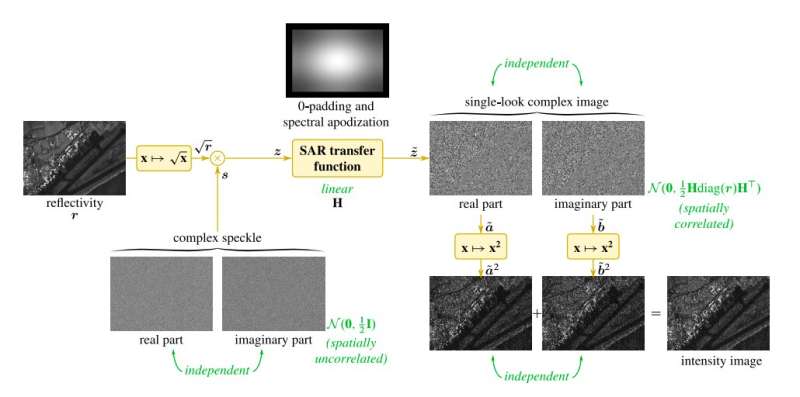
When a highly coherent light beam, such as that emitted by radars, is diffusely reflected on a surface with a rough structure (e.g., a piece of paper, white paint or a metallic surface), it produces a random granular effect known as the ‘speckle’ pattern. This effect results in strong fluctuations that can reduce the quality and interpretability of images collected by synthetic aperture radar (SAR) techniques.
SAR is an imaging method that can produce fine-resolution 2D or 3D images using a resolution-limited radar system. It is often employed to collect images of landscapes or object reconstructions, which can be used to create millimeter-to-centimeter scale models of the surface of Earth or other planets.
To improve the quality and reliability of SAR data, researchers worldwide have been trying to develop techniques based on deep neural networks that could reduce the speckle effect. While some of these techniques have achieved promising results, their performance is still not optimal.
One reason for this is that most existing models learn to de-speckle images through a supervised learning process, which means that they also require speckle-free images during training. This can make training them very challenging, as speckle-free SAR images are typically unavailable and thus need to be fabricated or substituted with other images.
A team of researchers at the Polytechnic Institute of Paris and University of Lyon have recently introduced a new self-supervised learning strategy for training deep neural networks to reduce speckle effects in SAR data. This method was introduced in a paper pre-published on arXiv and set to appear on IEEE Transactions on Geoscience and Remote Sensing.
“So far, most approaches have considered a supervised training strategy, where the networks are trained to produce outputs as close as possible to speckle-free reference images,” Emanuele Dalsasso, Loic Denis and Florence Tupin, the researchers who carried out the study, told TechXplore. “Speckle-free images are generally not available, which requires resorting to natural or optical images or the selection of stable areas in long time series to circumvent the lack of ground truth. Self-supervision, on the other hand, avoids the use of speckle-free images.”
The new strategy for training despeckling deep neural network-based models introduced by this team of researchers was dubbed MERLIN (coMplex Self-supeRvised despeckLINg). MERLIN works by separating real and ‘imaginary’ parts of complex SAR images.
Remarkably, the strategy can be used to train all types of deep neural network architectures. Contrarily to previously proposed approaches, it is fully unsupervised and allows researchers to train despeckling models using single-look complex (SLC) images. SLC images are images generated from raw SAR data where individual image pixels contain amplitude and phase-related information.
“In contrast to other existing works, MERLIN does not require additional hypotheses like the absence of spatial correlations of the speckle, or temporal stability throughout a time series,” the researchers wrote in their paper.
Dalsasso, Denis, and Tupin evaluated their training strategy in a series of tests and found that it could be effectively used to train all kinds of deep despeckling networks. Moreover, models trained with MELIN achieved highly promising results, even if they were not trained on speckle-free images.
“Networks trained with MERLIN take into account the spatial correlations due to the SAR transfer function specific to a given sensor and imaging mode,” the researchers wrote in their paper. “By requiring only a single image and possibly exploiting large archives, MERLIN opens the door to hassle-free as well as large-scale training of despeckling networks.”
In the future, this self-supervised learning strategy could be of great value for research in geology and in other Earth-related fields of study. In fact, it could allow research teams to train despeckling models more easily and efficiently, improving the quality of SAR data without having to compile large datasets of speckle-free images.
Learning aids: New method helps train computer vision algorithms on limited data
Emanuele Dalsasso, Loïc Denis, Florence Tupin, As if by magic: self-supervised training of deep despeckling networks with MERLIN. arXiv:2110.13148v1 [cs.CV], arxiv.org/abs/2110.13148
© 2021 Science X Network
Citation:
MERLIN: A self-supervised strategy to train deep despeckling networks (2021, November 8)
retrieved 8 November 2021
from https://techxplore.com/news/2021-11-merlin-self-supervised-strategy-deep-despeckling.html
This document is subject to copyright. Apart from any fair dealing for the purpose of private study or research, no
part may be reproduced without the written permission. The content is provided for information purposes only.
For all the latest Technology News Click Here
For the latest news and updates, follow us on Google News.

